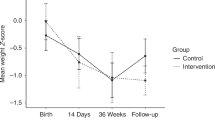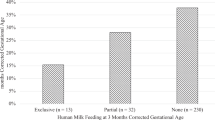Abstract
Background:
The effect of human milk intake on neurodevelopment in preterm infants is uncertain.
Methods:
We analyzed data from 611 participants in the DHA for Improvement of Neurodevelopmental Outcomes study, enrolled at ≤33 wk gestation from five Australian perinatal centers. The main exposures were (i) average daily human milk intake during the neonatal hospitalization and (ii) total duration of human milk intake before and after discharge. Outcomes were Bayley Scales of Infant Development, 2nd Edition Mental (MDI), and Psychomotor (PDI) Development Indexes.
Results:
Adjusting for confounders in linear regression, human milk intake was not associated with higher MDI (0.2 points per 25 ml/kg/d; 95% confidence interval (CI): −0.6, 1.0) or PDI (−0.3 points; 95% CI: −1.1, 0.4). Longer duration of human milk intake was also not associated with MDI (0.1 points per month; 95% CI: −0.2, 0.3) or PDI (−0.2 points per month; 95% CI: −0.5, 0.01) scores, except in infants born 29–33 wk gestation (n = 364, MDI 0.3 points higher per additional month, 95% CI: 0.1, 0.6).
Conclusions:
We found no associations of human milk intake during the neonatal hospitalization with neurodevelopment at 18 mo corrected age.
Similar content being viewed by others
Log in or create a free account to read this content
Gain free access to this article, as well as selected content from this journal and more on nature.com
or
References
Bhutta AT, Cleves MA, Casey PH, Cradock MM, Anand KJ. Cognitive and behavioral outcomes of school-aged children who were born preterm: a meta-analysis. JAMA 2002;288:728–37.
Outcomes CoUPBaAH. Preterm Birth: Causes, Consequences, and Prevention. Washington, DC: The National Academies Press, 2007.
Hill JL, Brooks-Gunn J, Waldfogel J. Sustained effects of high participation in an early intervention for low-birth-weight premature infants. Dev Psychol 2003;39:730–44.
Rouse DJ, Gibbins KJ. Magnesium sulfate for cerebral palsy prevention. Semin Perinatol 2013;37:414–6.
Schmidt B, Roberts RS, Davis P, et al.; Caffeine for Apnea of Prematurity Trial Group. Long-term effects of caffeine therapy for apnea of prematurity. N Engl J Med 2007;357:1893–902.
Jain A, Concato J, Leventhal JM. How good is the evidence linking breastfeeding and intelligence? Pediatrics 2002;109:1044–53.
Anderson JW, Johnstone BM, Remley DT. Breast-feeding and cognitive development: a meta-analysis. Am J Clin Nutr 1999;70:525–35.
Drane DL, Logemann JA. A critical evaluation of the evidence on the association between type of infant feeding and cognitive development. Paediatr Perinat Epidemiol 2000;14:349–56.
Belfort MB, Rifas-Shiman SL, Kleinman KP, et al. Infant feeding and childhood cognition at ages 3 and 7 years: effects of breastfeeding duration and exclusivity. JAMA Pediatr 2013;167:836–44.
Brion MJ, Lawlor DA, Matijasevich A, et al. What are the causal effects of breastfeeding on IQ, obesity and blood pressure? Evidence from comparing high-income with middle-income cohorts. Int J Epidemiol 2011;40:670–80.
Kramer MS, Aboud F, Mironova E, et al.; Promotion of Breastfeeding Intervention Trial (PROBIT) Study Group. Breastfeeding and child cognitive development: new evidence from a large randomized trial. Arch Gen Psychiatry 2008;65:578–84.
Kleinman RE, ed. Pediatric Nutrition Handbook. 6th edn. Elk Grove Village, IL: American Academy of Pediatrics; 2009.
Vohr BR, Poindexter BB, Dusick AM, et al.; NICHD Neonatal Research Network. Beneficial effects of breast milk in the neonatal intensive care unit on the developmental outcome of extremely low birth weight infants at 18 months of age. Pediatrics 2006;118:e115–23.
Rozé JC, Darmaun D, Boquien CY, et al. The apparent breastfeeding paradox in very preterm infants: relationship between breast feeding, early weight gain and neurodevelopment based on results from two cohorts, EPIPAGE and LIFT. BMJ Open 2012;2:e000834.
Quigley MA, Hockley C, Carson C, Kelly Y, Renfrew MJ, Sacker A. Breastfeeding is associated with improved child cognitive development: a population-based cohort study. J Pediatr 2012;160:25–32.
O’Connor DL, Jacobs J, Hall R, et al. Growth and development of premature infants fed predominantly human milk, predominantly premature infant formula, or a combination of human milk and premature formula. J Pediatr Gastroenterol Nutr 2003;37:437–46.
Furman L, Wilson-Costello D, Friedman H, Taylor HG, Minich N, Hack M. The effect of neonatal maternal milk feeding on the neurodevelopmental outcome of very low birth weight infants. J Dev Behav Pediatr 2004;25:247–53.
Pinelli J, Saigal S, Atkinson SA. Effect of breastmilk consumption on neurodevelopmental outcomes at 6 and 12 months of age in VLBW infants. Adv Neonatal Care 2003;3:76–87.
Koo W, Tank S, Martin S, Shi R. Human milk and neurodevelopment in children with very low birth weight: a systematic review. Nutr J 2014;13:94.
Makrides M, Gibson RA, McPhee AJ, et al. Neurodevelopmental outcomes of preterm infants fed high-dose docosahexaenoic acid: a randomized controlled trial. JAMA 2009;301:175–82.
Bellinger DC. What is an adverse effect? A possible resolution of clinical and epidemiological perspectives on neurobehavioral toxicity. Environ Res 2004;95:394–405.
Ip S, Chung M, Raman G, et al. Breastfeeding and maternal and infant health outcomes in developed countries. Evid Rep Technol Assess (Full Rep) 2007:1–186.
Hüppi PS, Warfield S, Kikinis R, et al. Quantitative magnetic resonance imaging of brain development in premature and mature newborns. Ann Neurol 1998;43:224–35.
Belfort MB, Rifas-Shiman SL, Sullivan T, et al. Infant growth before and after term: effects on neurodevelopment in preterm infants. Pediatrics 2011;128:e899–906.
Hack M, Taylor HG, Drotar D, et al. Poor predictive validity of the Bayley Scales of Infant Development for cognitive function of extremely low birth weight children at school age. Pediatrics 2005;116:333–41.
Koletzko B, Poindexter B, Uauy R (eds). Nutritional Care of Preterm Infants: Scientific Basis and Practical Considerations, 3rd edition. Basel: Karger Publishers, 2014.
Li R, Scanlon KS, Serdula MK. The validity and reliability of maternal recall of breastfeeding practice. Nutr Rev 2005;63:103–10.
The CRIB (clinical risk index for babies) score: a tool for assessing initial neonatal risk and comparing performance of neonatal intensive care units. The International Neonatal Network. Lancet 1993;342:193–8.
Frankenburg WK, Coons CE. Home Screening Questionnaire: its validity in assessing home environment. J Pediatr 1986;108:624–6.
Oken E, Kleinman KP, Rich-Edwards J, Gillman MW. A nearly continuous measure of birth weight for gestational age using a United States national reference. BMC Pediatr 2003;3:6.
Author information
Authors and Affiliations
Corresponding author
PowerPoint slides
Rights and permissions
About this article
Cite this article
Jacobi-Polishook, T., Collins, C., Sullivan, T. et al. Human milk intake in preterm infants and neurodevelopment at 18 months corrected age. Pediatr Res 80, 486–492 (2016). https://doi.org/10.1038/pr.2016.114
Received:
Accepted:
Published:
Issue date:
DOI: https://doi.org/10.1038/pr.2016.114
This article is cited by
-
Human Breast Milk: Bioactive Components, from Stem Cells to Health Outcomes
Current Nutrition Reports (2020)



